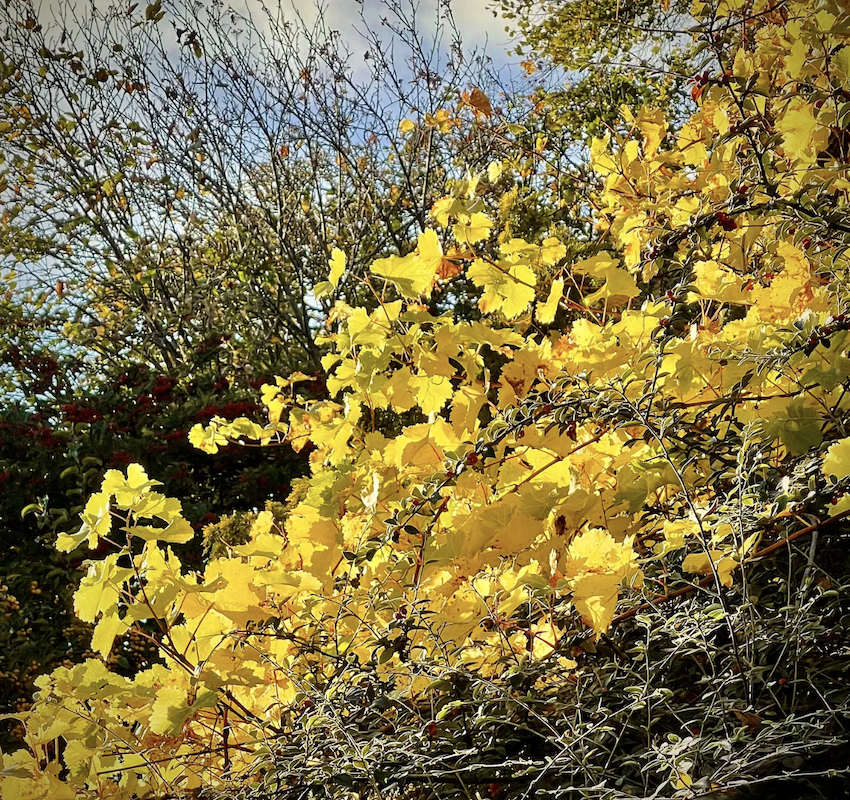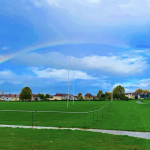On wealth and freedom in public spaces
Who owns the rainbow? Who owns the clouds, the lakes, the trees, the autumnal leaves on a grapevine falling gently off an estate wall? You see, an animal won’t understand the concept of land ownership, for instance. A frog will come back to the same wintering pond but won’t ask us for permission to hibernate on our allotment plot. It will simply choose a safe spot to do so. If we “own” the rights to the plot, we claim the right to all Nature inhabiting it, but the frog – quite frankly – doesn’t care.
Since the dawn of times, humans decided to profit from land and from the earliest of times when they did so, the idea of inequality emerged too. Women lost their equality when land ownership led to increasing wealth of the few while others were asked to work. And finally, the idea of owning another human being emerged out of the need to work the land and grow…wealthier. (I am still baffled by the idea of ancient or modern slavery or the notion of some business leaders claiming the right to own their staff in their language and in their actions…I find that deeply disturbing, to be honest). Here, in the UK, the newly updated trespassing laws are now targeting the GTR (Gipsy Roma Traveller) community, making it virtually impossible for the nomadic cultures to co-exist with the more static, dominating way of living.
But who really, truly owns the land? And does Mother Nature care? It is a question I was pondering as a little girl roaming the summer wheat fields of Poland, poppy-spotting, cornflower-spotting and occasionally wild-strawberry-spotting. I observed the universal need for balance, not exponential growth, in petals, leaves, and seeds. I still sense it, and I honestly believe that most of us feel it deep inside.
Maybe some of us forget, but that universal truth is in our DNA. We used to live in balance and in movement. We used to access and know a much wider variety of natural foods, for example, and leave more than enough for others coming behind us. As I am reading the “Wilderness Cure” – Mo Wilde’s journey through the year with only foraged food, I am only now realising how limited is our modern way of being – and I am only reading about the diet! Maybe we need reminders.
So as I open the pages of “The Climate Book”, published this week by Greta Thurnberg in collaboration with so many giants of the scientific world, I am reminded: we know very well that our individual and collective greed will kill us if we don’t stop. It’s not only a matter of a frog, a woman, a slave or our diet. We are facing a planetary crisis.
What can we do to change and save ourselves? I think the answer is to get rid of our ego. What if we were to think of Nature as our siblings instead? What if the rainbow was a sister witnessing and brightening our day? What if we should ask permission from the cousin frog to cultivate the beds next to the allotment pond? What if our mother, sister, or daughter did not have to cook all the time and could afford more energy to enjoy a fulfilling job – as much as men do? What if all people were free humans allowed to live as they wish to without the very few defining the limitations of their humanity?
You may think that placing a rainbow, frog and humans in the same paragraph is confusing, but it is not to me. I do not see a difference between any of those atoms. We are all part of the same system and should all be allowed to decide how those systems operate collectively. Yet, we seem to forget that the leaders are primarily chosen to protect us and maintain that healthy balance, and their role’s perks (be it wealth or reputation) should come last.
Why is this important for digital well-being, you may ask? Well, yesterday, Elon Musk purchased Twitter, and something quite significant shifted in the world of social media. One of the leading social media platforms is now owned by one individual. Many digital professionals understand the legal and collective consequences of this – it is generally not a good idea for one person to own such a vast virtual country of users, their personal data, their opinions and online behaviours. Now your tweets belong to that one person. How does that make you feel?

Maybe it is time to finally start thinking about the ownership of the social media channels we use. When I speak with my clients about social media strategies, I always recommend using a few leading platforms for this very reason – the content we post there, the online identity we shape there as individuals or brands, only partially belongs to us. It is, of course, co-created by our followers and the very platform we are on. Twitter, Meta (Facebook, Instagram, WhatsApp), and TikTok teams (actual people behind those channels) also co-own our identity there. We need to reflect on those platforms before we agree to contribute to them with our data and identity.
The leading social media channels operate like countries: they have governance and rules we all need to follow. Some rules are visible, but others – like algorithms – are not. Some rules are defined by the company that owns the platform, and other rules by the community. We have a choice to enter that country, participate and follow or not follow those rules.
The leading social media channels are accountable to their relevant regulators. We tend to forget that they are owned by living, breathing humans who must live somewhere and thus are obliged by their local laws and regulations. Something Musk was made aware of as a gentle reminder yesterday.
And finally, those channels also operate as media outlets – think a good, old-fashioned book or a printed weekly magazine. The content is regulated by publishing laws and owned by the authors (you) and publishers (social media platform). Various platform copyright rules apply, of course, but it is always safe to assume that you co-own your words on those platforms.
So, when we think about the ownership of our words, behaviours and our identity on social media channels, we need to consider all those aspects and do one simple thing: make an informed choice. Every single time you post, you are responsible for your words and actions in the context of all those rules and ownerships. So offer and use your words wisely. If we want a healthy, balanced social media environment, we must work towards sustainable communities there too. Elon Musk may have a say in how you will feel on Twitter next week, but so do you. A balanced social media channel is not shaped by people leaving or switching off but by all of us doing the homework and using it consciously, with full awareness of our actions.
(Reflection)
A strong sense of personal and collective agency is crucial for our good digital well-being. To cultivate our agency, we need to practice making informed choices. Staying informed and understanding how social media channels work is an important aspect of that, so today, I encourage you to explore simple social media actions and their wider consequences.
Q: Who owns a rainbow emoticon in your tweet? Who owns a frog emoticon in your Instagram post? What work-related information can you safely post on LinkedIn – do you have a social media policy at work? What are the consequences of tagging your younger family member in Facebook photos? What routes can you safely log on the Strava fitness app, and what routes could expose your family or clients? What can you do to keep yourself and others safer when using social media channels? What do you need to learn about those tools to make more informed choices?
(I am off to meet with a friend who explores all those questions in the next wave of digital technologies – artificial intelligence – to learn more myself. Wishing you all a good weekend!)
This post was originally posted on Substack in our Syl’s Liberation Psychologies Newsletter.

